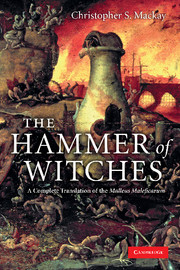Book contents
- Frontmatter
- Dedication
- Contents
- Map
- Introduction
- THE HAMMER OF WITCHES
- Structure of the text
- Author's Justification of the “Hammer for Sorceresses”
- Text of the Apostolic Bull
- Approbation and Signatures of the Doctors of the Illustrious University of Cologne
- PART I
- Question 1
- Question 2
- Question 3
- Question 4
- Question 5
- Question 6
- Question 7
- Question 8
- Question 9
- Question 10
- Question 11
- Question 12
- Question 13
- Question 14
- Question 15
- Question 16
- Question 17
- Question 18
- PART II
Question 15
from PART I
Published online by Cambridge University Press: 05 August 2015
- Frontmatter
- Dedication
- Contents
- Map
- Introduction
- THE HAMMER OF WITCHES
- Structure of the text
- Author's Justification of the “Hammer for Sorceresses”
- Text of the Apostolic Bull
- Approbation and Signatures of the Doctors of the Illustrious University of Cologne
- PART I
- Question 1
- Question 2
- Question 3
- Question 4
- Question 5
- Question 6
- Question 7
- Question 8
- Question 9
- Question 10
- Question 11
- Question 12
- Question 13
- Question 14
- Question 15
- Question 16
- Question 17
- Question 18
- PART II
Summary
TO make sure that it does not seem inappropriate to anyone that by divine permission many innocent people suffer loss and are punished in connection with the foregoing varieties of harm on account of someone else's (the sorceresses') sins and not instances of personal guilt, St. Thomas shows (Second of Second, Q. 108 [108.4.Ra4]) that it is just for this to be done by God in three ways (speaking of the penalties in the present life). The first is when one man is the property of another, and the one person can be punished as a penalty for the other in the same way that a person is punished in connection with his goods. For in their body children are a certain sort of property of their father, | and slaves and animals are that of their owners, and in this way children are sometimes punished in place of their parents. For instance, the son born to David from adultery promptly died [2 Sam. 12:7–23] and the killing of the animals of the Amelechites was commanded [1 Sam 15:2–3]. (In such instances there may also be some mystical rationale, as is stated in 1, Q. 4 § “Paruulos”). The second way is when the sin of one person is transferred to another. This happens in two ways. One is through imitations. For instance, children imitate the sins of their parents, and slaves and subordinates imitate those of their masters, so that they sin more boldly. This is the case with wrongly acquired goods that the children inherit, and slaves sin more boldly in connection with acts of brigandage and unjust wars, which quite often result in their being killed. The subordinates of prelates sin more boldly when they see the prelates sin (even if they do not commit the same sins), which also results in their being justly punished.
The sin of one person is also transferred to another as a form of merit, such as when the sins of his subordinates are transferred to an evil prelate.
- Type
- Chapter
- Information
- The Hammer of WitchesA Complete Translation of the Malleus Maleficarum, pp. 236 - 242Publisher: Cambridge University PressPrint publication year: 2009



